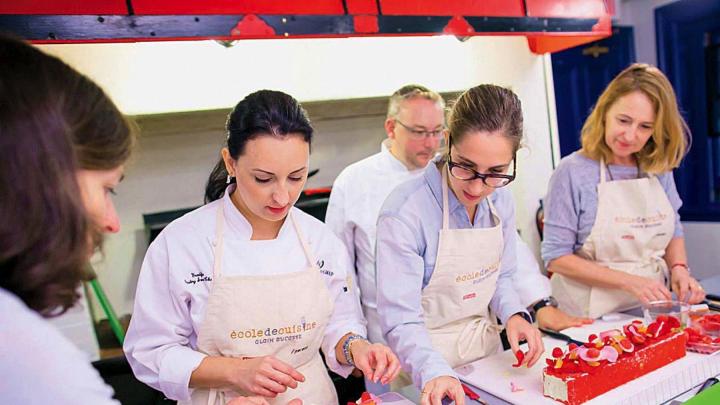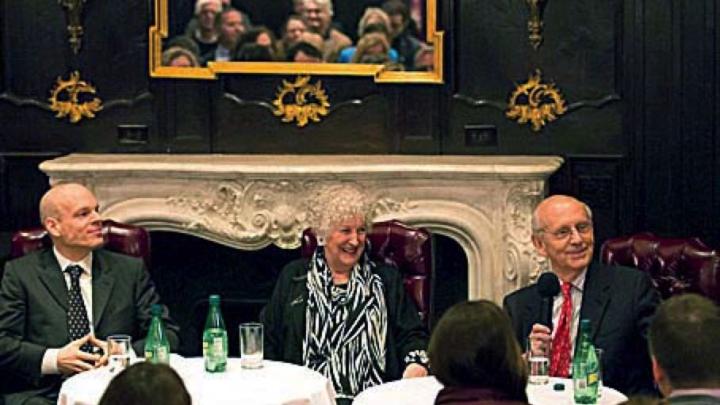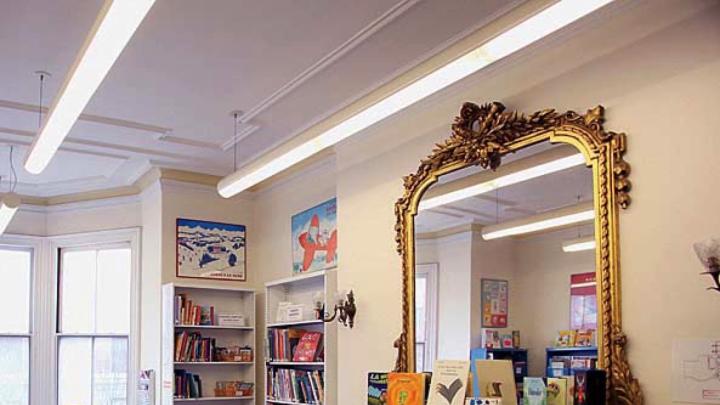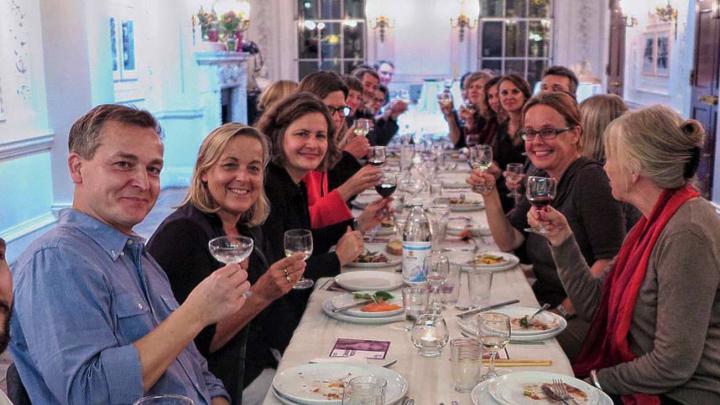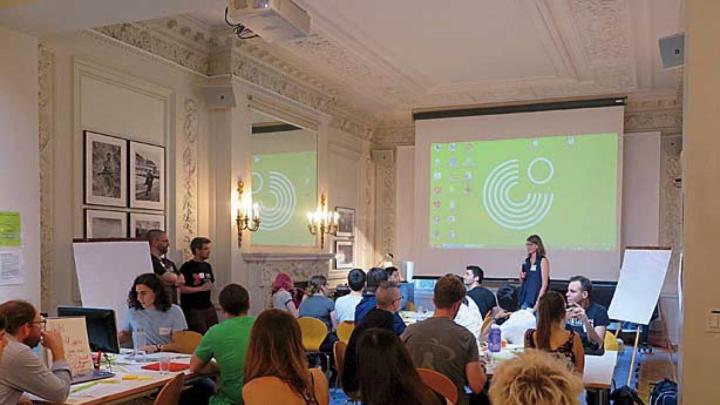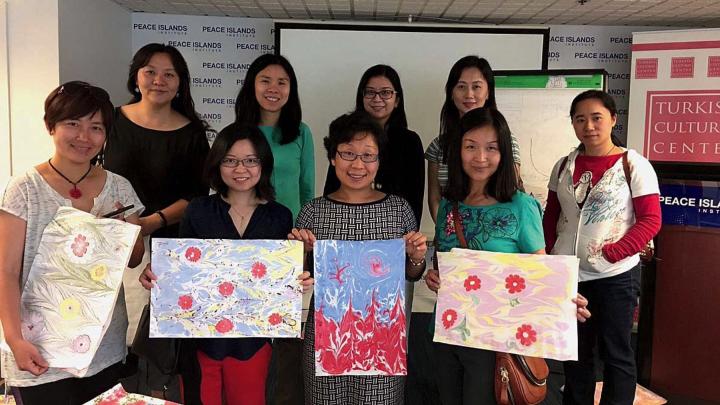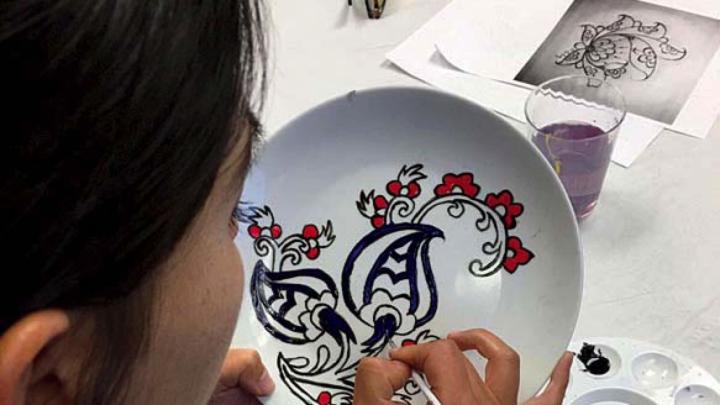“Our library has 30,000 volumes and a children’s room, we hold 50 to 60 events a year—wine tastings and cooking demonstrations, discussion groups, and concerts,” Barbara Bouquegneau, executive director of the French Library, said while leading a tour around the 1860s Beaux Arts-style Back Bay mansion that has housed the center since 1945.
There’s a new “Behind the Scenes” fashion series kicking off on November 16 with a cocktail reception, fashion show, and guest speakers, and the annual Marché de Noël—quality nibbles, stylish gifts—on December 9. “And,” she notes, “we teach French to 700 students a year, starting from age one, until you can’t take it anymore.”
The center is among many such international educational organizations in Greater Boston—the Iranian Association of Boston, the Irish Cultural Centre of New England, the Japan Society of Boston, the Dante Alighieri Society of Massachusetts, the Turkish Cultural Center of Boston, and the Goethe-Institut, among them—that serve a wide audience, from expats and visiting professionals to scholars and foreign-culture ’philes.
The larger organizations all offer a range of public activities focused on arts and culture, food, holiday celebrations, history, and current events most often aimed at preserving or promoting cultural heritage. They can also help supplement academic programs in the region and independent learning, from the elementary grades through adulthood.
“Our purpose is to connect Japan with Boston, for friendship, mutual understanding, and learning,” says Matt Krebs, executive director of the Japan Society. That includes working with local Japan scholars and language teachers, or university students and administrators developing trips to Japan, and reaching out to the Japanese expat community. There are monthly brown-bag lunches with speakers at the society’s Boston office, and anyone can subscribe to the society’s bimonthly newsletter, which lists its own and other Japanese-related events around the region. On November 7, at Harvard, the society is co-presenting a lecture, “Japan’s Trade Strategy in an Age of Protectionism,” by Japanese diplomat Yoichi Suzuki, a visiting fellow at the University’s Weatherhead Center for International Affairs.
The Turkish Cultural Center of Boston, on Commonwealth Avenue in Allston, strives to foster cross-cultural awareness. Its classes—Turkish, cooking (from baklava to kebabs), and art (ebru, or paper marbling, and çini, ceramic painting)—are typically geared to Americans. “In one year we have more than 4,000 students, and only about 50 of them are Turkish-Americans,” says center manager Olsen Turan. Unless they are learning the language, he says of the latter group, they “don’t want to take these classes because they already know the traditions.” But members of both groups do come out for periodic movie nights, as well as the lively monthly Turkish Coffee Nights featuring book discussions, concerts, and guest speakers.
In Canton, the Irish Cultural Centre of New England sits on 46 acres and aims to “serve as a focal point for the expression of Irish culture through a variety of activities, events, and programs, which promote and showcase Irish culture” across the region.
In addition to the Boston Irish Festival, held every June, it offers classes in Irish language and history, and music and dance (tin whistle, fiddle, bodhrán, and accordion; and set dancing and percussive stepping), along with dramatic performances and readings of Irish plays and books. For sports enthusiasts, there are summer games (hurling and Gaelic football) played through the Northeast Division of the Gaelic Athletic Association. And the pub on site, open on weekends, features traditional Irish sessions on Friday nights.
For German language and culture, the Goethe-Institut Boston has been around since 1967. Its historic Back Bay townhouse closed for renovations at the end of September, to reopen next summer, but a full line-up of language classes and events is being held elsewhere, according to cultural program curator Karin Oehlenschläger.
The organization has strong ties to Boston’s artistic and academic communities, and regularly sponsors lectures, book and film gatherings, philosophical talks, and culinary events. Gatherings this fall included an art exhibit and a panel discussion of the ramifications of the German elections. On November 5, as part a continuing German film series at the Coolidge Corner Theatre in Brookline, rising director Julia Langhof will be on hand for a screening of her movie LOMO: The Language of Many Others (2017), about an adolescent boy grappling with questions of identity.
The Iranian Association of Boston, based in Watertown, runs Farsi classes as well as popular holiday gatherings. Students range from curiosity-seekers and those studying the Middle East to Iranian-American children “whose parents want them to understand the Persian/Iranian traditions,” says center president Saeed Pirooz.
The nonprofit association was established in 1989 specifically as a nonreligious, nonpolitical group to “promote Iranian cultural exchange,” he says. Anyone can attend events. “The only things not welcome,” he adds, “are any kinds of religious or political statements, or agendas. IAB is not the venue for those discussions. The focus is on culture and art.”
October marked Mehregan, a harvest festival featuring Persian-related poetry and live traditional music, he says. Participants can share poems they love, recite their own, or just come to listen and enjoy Persian food. (There are at least five year-round places for Persian fare in Watertown itself: Molana Restaurant, Shiraz Persian Cuisine, Tabrizi Bakery, Roksana’s, and Dizin FruttiBerri ice cream.)
On December 16, the association hosts a Yalda Night party to celebrate the longest night of the year. “There are discussions about what families do on this holiday, what kinds of foods are eaten—food is a huge part of the culture, and I think it’s the best-tasting food, it was [developed] over thousands of years. But I may be biased in that,” he says. There’s also music and dancing. “Folk-dancing Iranians are loud and fun,” he says, cheerfully. “And they try to really have a good time at parties. Everyone gets out on the floor.”
